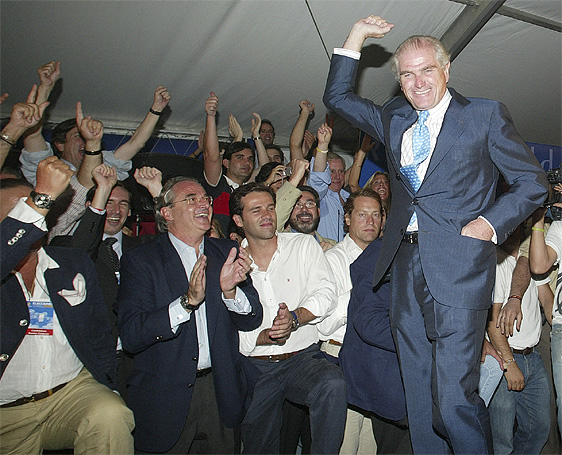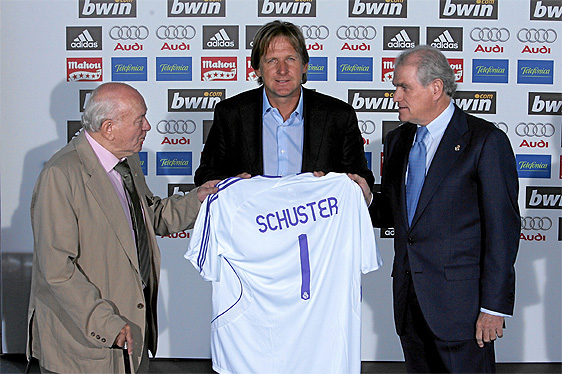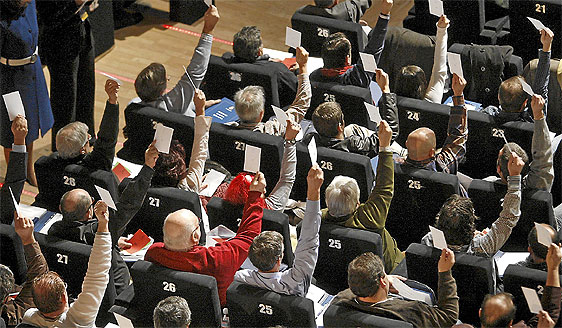
On Wednesday he said that to resign would be "cowardly". On Friday, he resigned.
On Wednesday he had the full support of his Board of Directors. On Friday, they deserted him.
On Wednesday, he swore on his "honour" that he had nothing to do with the shady goings-on at last month's AGM. By Friday, those who took the fall were pointing the finger of blame in his direction.
Vicente Boluda, vice-president of Real Madrid, will take over as interim president until new elections take place in the summer, after the current season ends.
Ramón Calderón has had a turbulent few days, ending with his resignation as Real Madrid president. But he has been sowing the seeds of his own destruction from the moment he was elected: July 2006: Wins the presidential elections, promising to bring Kaká, Cesc and Robben to the club. Out of these three, he only managed to sign the Dutchman, over a year after the promise was made.
July 2006: Wins the presidential elections, promising to bring Kaká, Cesc and Robben to the club. Out of these three, he only managed to sign the Dutchman, over a year after the promise was made.
October 2006: One of the failed candidates for the presidency, Juan Miguel Villar Mir, takes the club to court to have the postal vote (annulled at Calderón's insistence) reinstated.
December 2006: Calderón's first AGM ends with a rejection of his proposals to reform the postal vote, amid calls by angry socios for new elections to legitimise the presidency.
January 2007: In probably the worst of his many foot-in-mouth moments, Calderón is recorded by a journalist as he makes a number of unflattering remarks about his players. He later has to apologise to the entire squad.
February 2007: After a number of court appearances, a judge rules that the Real Madrid electoral process, especially those statues regulating the postal vote, are invalid, and therefore the election result must stand. However, the process has, to date, not been reformed. June 2007: Despite winning Real Madrid's first title for four years, Fabio Capello is sacked as Real Madrid coach. Two weeks later, Bernd Schuster is installed as his replacement, in what Calderón terms "a search for excellence". Well, we know how that ended.
June 2007: Despite winning Real Madrid's first title for four years, Fabio Capello is sacked as Real Madrid coach. Two weeks later, Bernd Schuster is installed as his replacement, in what Calderón terms "a search for excellence". Well, we know how that ended.
September 2007: Another AGM, another failure to institute any meaningful reform.
March 2008: Calderón is accused by journalist José Antonio Abellán of manipulating the selection of socios compromisarios: Real Madrid members empowered to vote at AGMs on behalf of the whole membership. He had previously accused him of "selling" season tickets in exchange for votes at the presidential election. Neither allegation has yet been challenged in court.
May 2008: Calderón fails, once again, to reform the club statutes (which are, remember, legally invalid) in an Extraordinary General Meeting.
August 2008: After chasing him all summer, Real Madrid fail to sign Cristiano Ronaldo from Manchester United. Worse, the club sells Robinho to Manchester City and does not find any suitable replacement in time for the start of the season.
October 2008: Calderón is accused of using the club's credit cards to fund his own lifestyle. There is little substantive proof, but the allegations about the president's tax affairs are quite damaging. December 2008: Real Madrid sign two players in the winter transfer market, Lass and Huntelaar, only to find that UEFA rules mean only one of them can be registered to play in the knock-out stages of the Champions League. The youth director resigns and accuses the president of "lack of knowledge or interest in the youth teams". At the AGM, Calderón manages to have the accounts and budget approved, albeit with a slim majority, amid many calls for his resignation. He then fires the coach, Schuster, and replaces him with Juande Ramos.
December 2008: Real Madrid sign two players in the winter transfer market, Lass and Huntelaar, only to find that UEFA rules mean only one of them can be registered to play in the knock-out stages of the Champions League. The youth director resigns and accuses the president of "lack of knowledge or interest in the youth teams". At the AGM, Calderón manages to have the accounts and budget approved, albeit with a slim majority, amid many calls for his resignation. He then fires the coach, Schuster, and replaces him with Juande Ramos.
January 2009: Marca publishes allegations of vote-fixing at the December AGM, finally resulting in Calderón's resignation as president. Allegations about fraudulent commissions in the signing of players like Van Nistelrooy and Cannavaro.
Friday, 16 January 2009
Going, going... gone
Posted by
TheAuthor
at
12:43
![]()
Labels: Abellán, Boluda, Calderón, Capello, Cristiano Ronaldo, Robinho, Schuster, Villar Mir
Subscribe to:
Post Comments (Atom)

12 comments:
Very true Gonzalo that Calderon had been foreshadowing his eventual fall with many of his acts since becoming president. Paradoxically despite all of these problems, on the field the team has been pretty successful winning consecutive league titles. I did not realistically expect a third title win in a row this year but I think only the most optimistic cule expected Barcelona to be so far in front of the league at the halfway stage.
Maybe it is because of the greater access we have now to news via the internet and increased games on television around the globe but I just don't recall past Madrid presidents being as shady as Sanz, Perez and now Calderon have been. The club I have loved and admired for 30+ years for having class now acts like a blustery drunk throwing cash around at a bar. These last few presidents have given our club a bad name.
Stumbled across your blog recently and just wanted to say how much I enjoy reading it... Very informative, detailed and full of intelligent insight.
@Martin
The Spanish football club president is a strange breed and seems to attracts certain types of individuals. Obviously not all are the same, but stereotypes generally grow from certain comment characteristics.
Mendoza, who was president before Sanz, had to resign due to allegations of corruption and the club very nearly went bankrupt because of him. However, Luis de Carlos, who was president before him is universally acknowledged as an old-fashioned gentleman, although he didn't have the sporting success that would make him on of the greats. Bernabéu of course, is legendary, but he was president in a very different era and it's hard to measure him using the same criteria.
I think I commented in another blog that Real Madrid is a 21st century institution run like a 19th century sports club. Time for root-and-branch reform; I just don't see who is going to step up and do it.
@isi, good to have you on board. Looking forward to your comments too!
Although entirely unlikely, I believe it would be beneficial for Madrid to appoint a president who is understated. I wonder whether current circumstances will provide a runner in this summer's election who deliberately stands for all those things that people like Calderon and his predecessors did not: youth development, a non-galactico transfer policy, team-unity (as opposed to autocracy etc.)
The nature of the elections means there is always going to be an element of populism and short-termism (2 things which any football club or business club must stave to avoid) but, as much as possible, it would be beneficial for Madrid to go about their business quietly for once... not least for the good of 'international relations'.
Latest polls show that the majority want florentino back, unbelievable.
Socios will vote for the candidate with the best player list as it's generally understood none of them are whiter than white (no pun intended)
The problem is that the summer is a long way away, and people's memories are short. I have little faith in the Real Madrid membership focusing very deeply on issues other than which new players is each candidate touting.
What I've heard about Florentino is that he may not stand as his wife's unwell and he may not want to dedicate the time. Despite the disastrous sporting/morale effect of the galactico policy, Florentino was responsible for two things: making the club profitable by focusing on building a brand and keeping out of the spotlight (and not putting his foot in it every 5 minutes)
Football fans (in the broad sense) are fickle and stupid, which is one of the many criticisms of democracy in the form of a Socio members' vote. It's all well and good to conform to the wishes of the fans, but if the majority of these fans are so thick that their opinion shouldn't even count, then it's not a very good system at all, is it...? Here we go again...
@isi,
I can live with the fact that in a democratic society a large proportion of the electorate is not particularly well informed and bases its decisions on largely shallow and erlatively unimportant matters. I may not like it, but I can accept it as the price to pay for all 'stakeholders' having an equal say.
However, I think the Real Madrid model is so opaque and open to manipulation that it cannot be properly described as democratic. To this effect I wrote an article just over a year ago that you may be interested in:
http://allinwhite.blogspot.com/2006/12/is-membership-model-in-need-of-change.html
It's very interesting, thanks Gonzalo. I hope it goes without saying that I, too, am ultimately in favour of some form of democracy (not just in football but in politics) on the grounds that it is the fairest way to consider the opinions of many (thousands of) people etc.
On a slightly unrelated note, I do think that - and this is not specific to Madrid - many football clubs, not to mention media platforms, are too heavily led by public opinion. In my opinion, there is a general level of over-favourability to football fans, to the point where institutions will either bow to public pressure (in the form of lobbying for a change to be made) or, more commonly, take the side of the 'fan', so as not to alienate its own customer/audience.
I don't mean to stary too far away from the subject of presidency and Real Madrid, but I am often upset by the constant backing of 'fans' by the likes of Sky Sports who will respond to, say, general levels of thuggery by certain people by saying out of context phrases such as "we appreciate your passion but..." or "the fans pay the players wages but...", where it might be more adviseable to take a stronger stand against such behaviour.
Sorry to hog this message board!
P.S. Please feel free to check out my blog: http://isidorelewis.blogspot.com
Gonzalo is correct that the nature of the beast is that club presidents in Spain whether they are at Madrid or Barcelona are going to be subject to institutional pressures which lead to them being either heroes or villains. Very rarely is there any middle ground and usually it all depends on how the club are doing on the field. Remember last summer Laporta almost was thrown out at Barcelona, now he is being hailed a genius for signing Guardiola as coach. Last year Calderon was being praised for signing Schuster and seeing the club easily win the league championship, it's second in a row. Now both president and coach are out at Madrid. How quickly the tide turns!
Frankly I think Villalonga the former Telefonica executive who nearly bought Valencia this summer is the sort of technocrat who might make some of the necessary institutional changes in the club that Gonzalo so well laid out that need to be done.
Like Martin and many others here I am a long time fan of the club and it saddens me to see the club's image tarnished in this way.
My turn for a plug, visit the forum I run for intelligent conversation about the world's game:
http://z8.invisionfree.com/Soccer_Futbol_Forum/index.php
Plug away guys, and there's no such thing as 'hogging' the comments board - the more the merrier!
@Merengue - I am not so sure about Villalonga's motivation. This is a man who had to leave Telefonica because he had been involved in insider trading its stock and who nearly took control of Valencia in the summer. Does Real Madrid need someone at the helm who wants to run a football club for its own sake (and, by extension, might then leave if something better comes along)?
Post a Comment